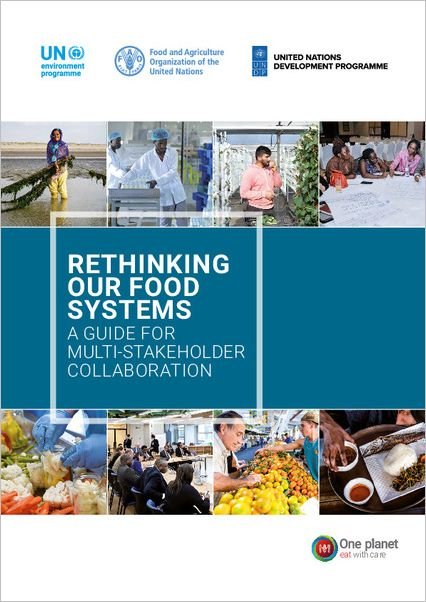 Read this article in French
Read this article in French- Share this article
- Subscribe to our newsletter
Rethinking food systems
The guide Rethinking food systems: a guide for multi-stakeholder collaboration aims to support stakeholders working towards the sustainable transformation of their food systems at all levels of the value chain. It was published by the United Nations Environment Programme (UNEP), the Food and Agriculture Organization of the United Nations (FAO) and the United Nations Development Programme (UNDP) in June 2023. This guide will also help governments and policy-makers working on efforts such as the National Pathways for Food Systems Transformation, developed in the context of the 2021 UN Food Systems Summit.
Policies designed in isolation are unlikely to deliver the 2030 Agenda for Sustainable Development; multi-stakeholder collaboration is essential to transition to sustainable food systems. Food systems involve complex challenges, which call for a systemic, multi-level and multi-stakeholder participatory approach for addressing interrelated issues across economic, social and environmental dimensions. This is the so-called “food systems approach”.
This guide targets public, private and civil society organisations convening multi-stakeholder collaboration initiatives, those where government and essential non-governmental actors join forces. The guide is organised around five building blocks:
- Building Block One looks at fostering broad multi-stakeholder collaboration involving different actors at multiple levels.
- Building Block Two underlines the importance of ensuring a good understanding of the food system so that a systemic approach can be used in addressing challenges and opportunities.
- Building Block Three looks at nurturing inclusive and effective collaboration.
- Building Block Four shows the importance of having a compass and a roadmap.
- Building Block Five focuses on ensuring sustainable collaboration.
Given their complexity, decisions related to food systems often require addressing power imbalances and making compromises. The interdependence of the building blocks shows that success is not merely about bringing science-based evidence and other types of knowledge to the table but requires navigating complicated social interactions between vested agendas and constituents, so that deliberations are carefully guided.
(UNEP/ile)
Read more and download the report on the UNEP website





Add a comment
Be the First to Comment